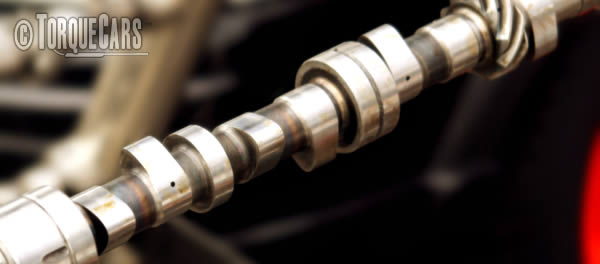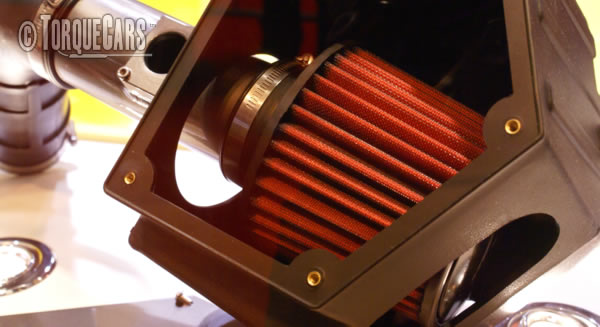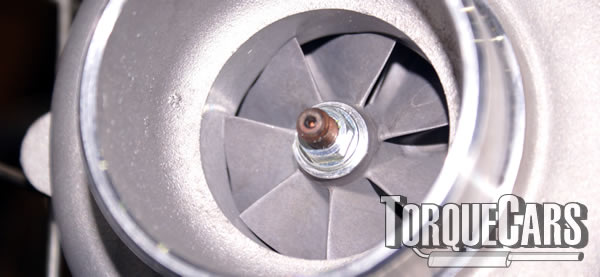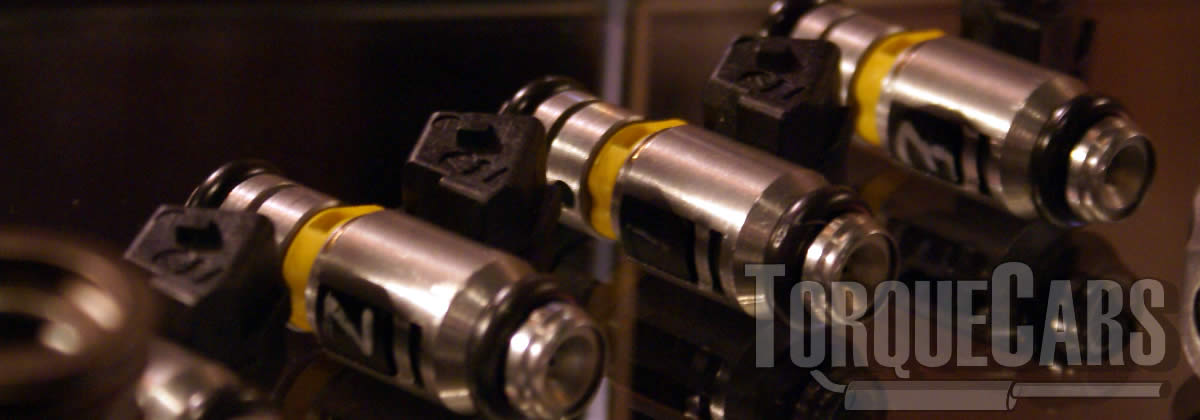Tuning the Nissan RB20
"All you need to know about tuning and performance parts on the Nissan RB20 engine!"
Carref prides itself on providing the latest tips and guides to your modification project.
Herein we consider RB20 tuning and report on the best modifications. Nissan RB20 are popular tuning projects and with carefully picked sports modifications like remapping, turbo improvements and camshafts you will noticeably enhance your driving pleasure.
We've seen the RB20 handling power around the 300-350bhp mark which is still very respectable.
The smaller capacity works well with a smaller turbo and produces very little lag compared to some RB25 project cars I've driven.
There were quite a few versions of this engine, the turbocharged ones are the preferred starting points, and you can't just add a turbo to the NASP versions, you need to do quite a bit of work to get these working.
We rely on our visitors to pass on tips and tell us about their projects and what worked on their car, and this article is the culmination of the feedback we have received. First let us look at the history and specs of this engine and then consider which tuning modifications work best on it.
History of the RB20 Engine
There were a variety of 2.0 L RB20 engines produced:
- RB20E
- single-cam NASP
- Power: 129 to 148 hp @5600 rpm 133 lbft @4400 rpm
- RB20ET
- single-cam, turbocharged
- Power: 168 hp @6000 rpm 152 lbft @3200 rpm
- RB20DE
- twin-cam NASP
- Power: 148 to 153 hp @6400 rpm 133 to 137 lbft @5600 rpm
- RB20DET
- twin-cam, turbocharged
- Power: 212 hpat 6400 rpm 195 lb⋅ft at 3200 rpm
- RB20P
- single-cam, NASP 12 valves, autogas LPG
- Power: 93 hp at 5600 rpm 105 lbft at 2400 rpm
- RB20DET-R
- twin-cam, turbocharged
- Power: 207 hp at 6400 rpm 181 lb⋅ft at 4800 rpm
- RB20DE NEO
- twin-cam NASP
- Power: 153 hp @6400rpm 138 lbft@5600rpm
What are the most effective RB20 parts
Most people will do a swap from the RB20 to the RB25 as this is generally regarded as a better starting point for serious power gains where your aim is over 450bhp.
The internals on the RB20 usually need upgrading around the 350bhjp region in your tuning projects depending on which version you have.
But we'll assume you want to stick with your RB20 and look at the mods which work best on this engine.
The best RB20 upgrades on an engine are typically the ones that give the best power gain for you spend the turbo engines are much better propositions for your tuning project.
We won't be swayed by popular RB20 upgrades, they need to be cost effective.
Significant gains on the RB20 can be made from camshaft upgrades. Altering the camshaft profile alters the intake and exhaust durations on the engine and can dramatically change the torque and power output.

Fast road camshafts usually boost the torque throughout the rpm band, you might lose a little low end torque but high end rpm power will improve.
Motorsport camshafts, boost the high end rpm power band but as a result the car will not idle smoothly and low end power nearly always suffers.
For a road car should ideally to match your bhp range to your usage of the car.
I would be surprised if you find a RB20 Motorsport cam is a pleasure to live with when driving around busy urban areas.
Different RB20 engines respond better to less aggressive camshaft durations so view each engine as unique.
The engine timing and fuelling also will say much on the bhp gains you'll achieve.

A longer valve duration can alter the bhp band and on most engines the exhaust and intake durations do not need to match, although most cams and tuners use matched pairs there are some advantages to extending the intake or exhaust durations.
Please watch our introduction Video tutorial to car tuning. Be sure to subscribe and support our new channel.
How to tune your car
- Improve the handling
Focus on Suspension improvements, such as coilovers and make sure the bushings are in good order and that the alignment is correct. Then focus on improving the brakes, with a big disk brake conversion kit and fast road brake pads.
- Remove restrictions
Focus on the intake and exhaust with filters being the common point of restriction in a tuned car. Intercoolers may also become restrictive on turbo engines so this may also need to be uprated.
- Burn more fuel & air
Increase the fuelling so it matches the air coming into the engine. The ratio is important so you need to improve the fuel pump and injectors, so the head mods, big valve conversions, fast road camshafts and forced induction upgrades extra supply of air is adequately met.
- Test and replace any weak parts
Weak areas are commonly the clutch, the turbocharger and pistons and crankshaft in a highly tuned engine. Makes sure these components will cope with your power aspirations.
- The Tune or Remap
A cars ECU controls the fuel, timing, spark and even the turbo in some cases, so to fully extract your gains you should remap the car last and this will fully release the power. Some cars are easy to map, and others require piggyback ECU's or aftermarket ECU's but this is the most vital step of your tuning project.
Modifying to Stage 1:
Sports exhaust manifold, Drilled & smoothed airbox, Remaps/piggy back ECU, Fast road camshaft, Intake headers, Panel air filters.
Modifying to Stage 2:
fuel pump upgrades, Fast road cam (around 272 degrees), Sports catalyst & performance exhaust, high flow fuel injectors, induction kit, Ported and polished head (essential at around 400bhp).
Modifying to Stage 3:
Adding or Upgrading forced induction (turbo/supercharger), Engine balancing & blueprinting, Twin charging conversions, Competition cam, Crank and Piston upgrades to alter compression, Internal engine upgrades (head flowing porting/bigger valves).
Remaps helps fully realize the full potential of all the upgrades you've done to your RB20.
It will usually give around 30% more power on turbocharged vehicles and you can expect to see around 15% on NASP engines, but figures achieved may vary depending on the upgrades you've done and the condition of your engine.
Many folks use piggy back ECU's but we would prefer to use the stock ECU as this has knock protection, which is something you are likely to need when tuning the RB20. Get your mapping wrong and the whole engine will be shot.
Apexi and Megasquirt are popular ECU's to use on the RB20 projects and offer quite a range of options and settings to suit mild road to motorsport upgrades.
Forcing air into your RB20 is vital to any engine upgrade project.
The intake plenum flow the air from the air filter and allow it to be drawn into the engine cylinders with fuel for the squish phase.
The bore size, shape and flow rate of the Intake headers can make a noticeable difference to to fuel engine efficiency on the RB20.
I usually find air intake manifolds are in dire need of aftermarket parts, although some manufacturers provide decently flowing air intake manifolds.
A front mounted intercooler kit will help drop the intake temps and bring back some of the power lost to heat soak.
Big valve conversions on the RB20, doing a bit of port work and head flowing will also improve bhp, and significantly will give you an improved bhp increase on other upgrades.
RB20 turbo upgrades - which are best?

NASP engines need quite a lot of work when you add a turbo, so we have a separate guide to help you take into account the pros and cons of going this route on your RB20
Sadly you can't just put a turbo on the NASP RB20 even thought they came with a turbo version. The Turbo version has a different compression ratio and is quite different component wise to the NASP version.
The RB25DET turbo provides more power and is relatively simple to mate to an RB20 block requiring only oil and air line rerouting.
- HKS 2835 380hp
- HKS2530 380hp (better for low end power)
- HKS GT3037 / 3037S 400-450hp
- GREDDY TD06-20G comes as a full kit
The more air you can get into an engine, the more fuel it can burn and uprating the induction with a turbocharger upgrade makes superb power gains.
If the engine has a turbocharger tuning mods are simpler to install and turbo charged engines are built with uprated components.
A front mounted intercooler and Walbro fuelpump are usually high on the list of mods for the Turbo versions of the RB20.
There are practical limits for every engine, with some being incredibly solid and some just sufficiently able to handle stock power
We recommend you find these limits and upgrade to forged components to utilize the power.
We've seen people spending a loads on turbocharger upgrades on the RB20 only to suffer the indignity of watching the whole thing explode when it's completed.
Large turbo chargers will usually suffer a bottom end lag, and little turbo chargers spool up more quickly but don't have the high rpm power band gains.
Thanks to progress the choice of turbo units is always improving and we now see variable vane turbo units, where the vane profile is altered according to speed to lower lag and increase top end torque.
Twin scroll turbo units divert the exhaust flow into two channels and feed these at differently profiled vanes in the turbocharger. They also help the scavenging effect of the engine.
It is not unusual that there's a restriction in the air flow sensor (AFM/MAF/MAP) on the when loads more air is being fed into the engine.
The Z32 AFM is a popular upgrade to the afm.
The E-Manage Ultimate and the Power FC piggyback ECUs are also used a lot on RB20 tuning projects where power exceeds what the stock ECU can handle.
Going up you'll find 4 bar air sensors coping with quite large power gains, whereas the OEM air sensor sapped power at a much lower level.
Adding a supercharger or additional turbo will make large bhp gains, although more complex to setup. We have a twincharger bhp adding guide if you want to read more.
Fuelling
You will need to ensure that the engine is not starved of fuel so need to look at the fuelling when you start extending past 20% of a bhp and torque increase. It is important to be generous with your injectors flow rate.
It is important to be generous with your injectors flow rate.
As a rule of thumb add 20% when buying an injector, this accounts for injector deterioration and provides a little spare capacity should the engine need more fuel.
We think this one is common sense, but you'll need to match your fuel injector to the type of fuel your car uses as well.
Choosing the right performance exhaust
One of the most common mistakes and problems we see in tuning projects is usually down to the exhaust, or rather a poorly chosen exhaust for your engine.
You may need to replace your exhaust if your current exhaust is creating a restriction.
On most factory exhausts you'll find the exhaust flow rate is fine even on modest power gains, but when you start pushing up the power levels you will need to get a better flowing exhaust.
Sports exhausts can help equal out the flow of gases through the engine.
But if your exhaust pipe is too big, ie: it's over 2.5 inches bore, you will lose much of the flow rate and end up sapping power and torque.
Usual exhaust restrictions can be traced to the catalysts installed, so adding a freer flowing race alternative will help avoid this restriction.
Weak spots Issues & problem areas on the
The engines are generally reliable and solid as long as they are regularly serviced and maintained.
Regular oil changes are vital on the , especially when tuned and will help extend the life and reliability of the engine.
The stock engine can handle around 350 bhp but you'll need to have added at least a turbo from the RB25 to get there.
Increasing the fuelling and turbo will see around 400-420bhp still on stock internals but the mapping must be spot on .
For more information on Tuning your engine please join us in our friendly forum where you can discuss tuning options in more detail with our owners. It would also be worth reading our unbiased tuning articles to get a full grasp of the benefits and drawbacks of each modification.
Please help us improve these tips by sending us your feedback in the comments box below.
We love to hear what our visitors have got up to and which upgrades work best for them on each model of car. Comments are used to improve the accuracy of these articles which are continually updated.
If you liked this page please share it with your friends, drop a link to it in your favourite forum or use the bookmarking options to save it to your social media profile.
Check out TorqueCars new YouTube channel, and see their awesome new content...
Feedback
Please use our forums if you wish to ask a tuning question, and please note we do not sell parts or services, we are just an online magazine.
Help us improve, leave a suggestion or tip
